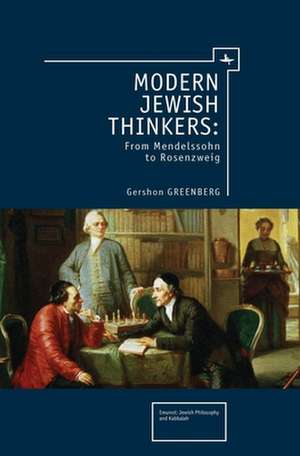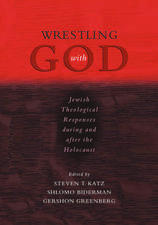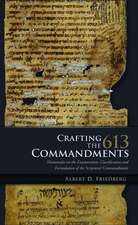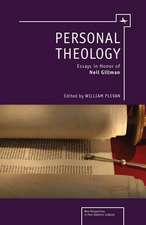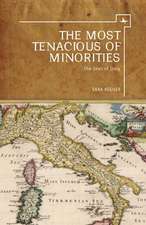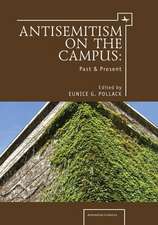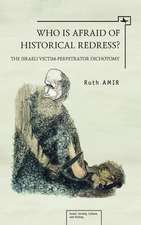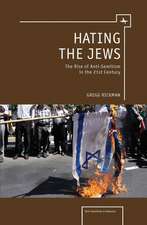Modern Jewish Thinkers: Emunot: Jewish Philosophy and Kabbalah
Autor Gershon Greenbergen Limba Engleză Paperback – 14 mai 2011
| Toate formatele și edițiile | Preț | Express |
|---|---|---|
| Paperback (1) | 327.92 lei 22-36 zile | |
| Academic Studies Press – 14 mai 2011 | 327.92 lei 22-36 zile | |
| Hardback (1) | 782.47 lei 43-57 zile | |
| Academic Studies Press – 31 mar 2011 | 782.47 lei 43-57 zile |
Din seria Emunot: Jewish Philosophy and Kabbalah
-
 Preț: 148.67 lei
Preț: 148.67 lei -
 Preț: 224.66 lei
Preț: 224.66 lei -
 Preț: 336.06 lei
Preț: 336.06 lei - 15%
 Preț: 565.76 lei
Preț: 565.76 lei - 15%
 Preț: 567.84 lei
Preț: 567.84 lei - 15%
 Preț: 571.58 lei
Preț: 571.58 lei - 15%
 Preț: 490.31 lei
Preț: 490.31 lei -
 Preț: 334.75 lei
Preț: 334.75 lei -
 Preț: 221.64 lei
Preț: 221.64 lei -
 Preț: 286.59 lei
Preț: 286.59 lei -
 Preț: 269.91 lei
Preț: 269.91 lei - 11%
 Preț: 597.77 lei
Preț: 597.77 lei - 23%
 Preț: 841.64 lei
Preț: 841.64 lei - 19%
 Preț: 698.19 lei
Preț: 698.19 lei - 23%
 Preț: 723.59 lei
Preț: 723.59 lei - 19%
 Preț: 636.87 lei
Preț: 636.87 lei - 23%
 Preț: 722.72 lei
Preț: 722.72 lei - 23%
 Preț: 720.92 lei
Preț: 720.92 lei - 23%
 Preț: 719.62 lei
Preț: 719.62 lei - 23%
 Preț: 779.66 lei
Preț: 779.66 lei - 23%
 Preț: 720.32 lei
Preț: 720.32 lei - 19%
 Preț: 697.22 lei
Preț: 697.22 lei - 23%
 Preț: 721.23 lei
Preț: 721.23 lei - 23%
 Preț: 782.30 lei
Preț: 782.30 lei - 23%
 Preț: 782.18 lei
Preț: 782.18 lei - 23%
 Preț: 779.36 lei
Preț: 779.36 lei - 19%
 Preț: 639.38 lei
Preț: 639.38 lei - 19%
 Preț: 640.00 lei
Preț: 640.00 lei - 23%
 Preț: 715.46 lei
Preț: 715.46 lei - 19%
 Preț: 694.44 lei
Preț: 694.44 lei - 23%
 Preț: 896.22 lei
Preț: 896.22 lei - 19%
 Preț: 643.74 lei
Preț: 643.74 lei -
 Preț: 259.77 lei
Preț: 259.77 lei -
 Preț: 447.20 lei
Preț: 447.20 lei
Preț: 327.92 lei
Nou
Puncte Express: 492
Preț estimativ în valută:
62.77€ • 68.20$ • 52.76£
62.77€ • 68.20$ • 52.76£
Carte disponibilă
Livrare economică 31 martie-14 aprilie
Preluare comenzi: 021 569.72.76
Specificații
ISBN-13: 9781936235469
ISBN-10: 1936235463
Pagini: 450
Dimensiuni: 156 x 234 x 25 mm
Greutate: 0.69 kg
Ediția:New.
Editura: Academic Studies Press
Seria Emunot: Jewish Philosophy and Kabbalah
ISBN-10: 1936235463
Pagini: 450
Dimensiuni: 156 x 234 x 25 mm
Greutate: 0.69 kg
Ediția:New.
Editura: Academic Studies Press
Seria Emunot: Jewish Philosophy and Kabbalah
Notă biografică
Descriere
Greenberg restructures the history of modern Jewish thought comprehensively, providing first-time English translations of Reggio, Krokhmal, Maimon, Samuel Hirsch, Formstecher, Steinheim, Ascher, Einhorn, Samuel David Luzzatto, and Hermann Cohen. The availability of these sources fills a gap in the field and stimulates new directions for teaching and scholarly research in modern Jewish thought.
